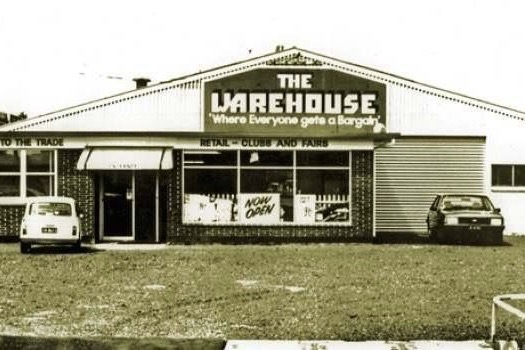Published on the 04/10/2023 | Written by Heather Wright

Core systems transformation ‘major investment’ for year…
The Warehouse Group says its ERP rollout is ‘progressing well’ and it is making significant progress in developing its operational systems to enable access to realtime data across procurement, distribution and fulfilment.
One of New Zealand’s largest retailers, The Warehouse Group (TWG) began its migration from Oracle E-business Suite to Oracle SaaS, including ERP and ERM in 2020, in what the company has said is ‘probably’ the biggest technology transformation it has undertaken. Its brands, which include Noel Leeming, Torpedo 7 and The Market, alongside The Warehouse and Warehouse Stationery, had previously used a range of ERP offerings.
“We remain committed to our strategy, but the alignment of these actions has put pressure on our business”
Around $100 million was earmarked for the project in 2020, with plans to standardise on Oracle for the backend, with Salesforce’s commerce cloud at the front.
The retailer’s FY23 annual results show heavy spend on core systems in FY23. Those core systems include delivery of the ERP finance and inventory, group order management system, warehouse management system, master data management, which is being extended to include Noel Leeming and supplier data, and the delivery of a new people and HR Human Capital Management system.
Much of the company’s $154.4 million project expenditure for the year related to key SaaS projects.
“Total project expenditure was $154 million including capital expenditure, prepayments, SaaS expenditure and operating expenditure,” the company says.
The multi-year ERP finance and inventory system (ERPFI) deployment is the most significant of the core system projects underway at The Warehouse Group, and is flagged in this year’s financials as among the company’s major investments for the year.
The finance module was deployed in FY22, with testing on the final end-to-end inventory module continuing through the first half of FY24, with go-live scheduled for the second half of FY24.
Torpedo7 has begun migration to the new ERP system, which ‘will replace and modernise legacy systems, streamline business operations and improve the experience for customers’, TWG says.
Nick Grayston, TWG CEO, says the new ERP finance inventory system is ‘progressing well’ and will provide more timely reporting, project accounting, real-time inventory management and enable improved stock availability.
“Continued purposeful investment in infrastructure that will reduce our cost to serve long term and enhance our customer experience remains a priority for the Group,” he says.
A master data system has been deployed across all brands and products and is integrated into the ERPFI, warehouse management system and eCommerce platforms.
Final work to integrate dimension and supplier data through a self-service platform is expected to be completed in FY24.
Meanwhile, the first phase of the group order management solution (GOMS) went live last October.
“Through our brands’ eCommerce webstore and mobile apps, future GOMS releases will deliver a single fulfilment optimisation solution integrated with realtime inventory for all our brands. This will improve our customer experience for online orders, delivery and click and collect.”
The year has also seen the go-live of a new Warehouse Management System.
“We are now embedding this new system to create better ways of working and unlocking operation and distribution efficiencies, including pack size optimisation and distribution of fuller pallets,” the company says.
On the human capital management front, the first release, which included deployment for around 2,400 employees went live in October 2022, with the full system going live in August 2023, rolling out to all 11,000 team members including stores and distribution centres.
The full deployment includes automation for recruiting and new employee processes as well as the employee self-service module.
The work is part of an organisation-wide digital transformation the retailer began in in 2019, as it sought to replace homegrown legacy systems.
Earlier this year it became the first New Zealand customer for unified supply chain and retail planning solutions vendor Relex, when it selected the Finnish company to supply an automated forecasting and replenishment solution. At the time Tania Benyon, The Warehouse Group chief product manager, said the Relex solution would add more resilience and keep the retailer ahead of demand as it continued to grow its integrated retail ecosystem of brands, products and services.
The company also embraced agile in 2020 and began moving its The Warehouse, Warehouse Stationery and Noel Leeming brands off individual web platforms and onto the Salesforce commercial cloud.
“We continue to upgrade our systems to support our customers better,” the company says.
“Our team members are rostered to work where and when they’re needed, thanks to our group workforce management solution that collaborates with other systems.
“Our ERP systems will help us predict, demand, plan and budget accurately. We’ve successfully implemented our agile model in stores and in the field to adapt to changing customer needs and allocate resources effectively.”
The $154.4 million in total project expenditure included capitalised project spend of $113.2 million in FY23 (FY22: $107.5 million) and prepayments of $11.4 million in relation to SaaS projects in FY23 (FY22: $8.2 million).
In addition to the capitalised portion, expensed project spend relating to SaaS projects amounted to $21.9 million and non-SaaS-related expensed project spend amounted to $7.9 million.
The investment came as The Warehouse, with its ‘affordable’ image, saw a record sales result of $1.9 billion, despite – or perhaps aided by – the tough economic environment. Group sales were up 3.2 percent to $3.2 billlion, however net profit after tax was down 56.2 percent to $37.5 million.
Technology chain Noel Leeming saw a 3.3 percent decline in sales to $1.1 billion as online sales crashed 33.7 percent.
Grayston says the peak period of heavy investment in the transformation of the group and its infrastructure in particular, coincided with a collapse in consumer confidence exacerbated by a change in accounting procedures, reducing capitalisation.
“We remain committed to our strategy, but the alignment of these actions has put pressure on our business and has impacted our performance in FY23,” Grayston says.
TWG says FY24 will see go-live of the ERPFI solution, final rollout of the group order management solution, further data enrichment in the master data management and the deployment of Microsoft Dynamics 365 at Torpedo7 to help integrate brands across the group.



























